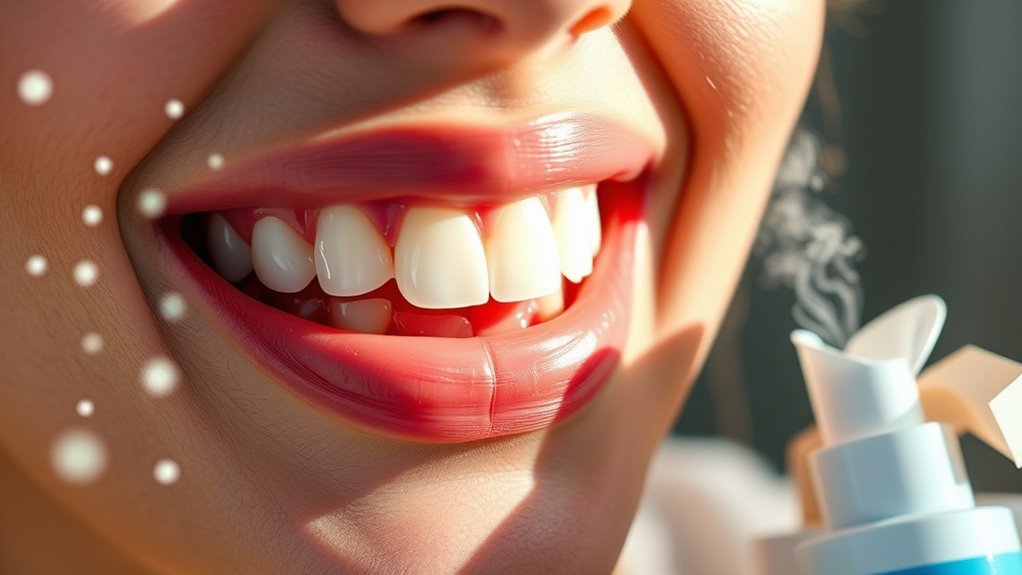Allergies can impact your oral health by causing dry mouth, which reduces saliva’s ability to protect your teeth and gums. Sinus congestion can lead to tooth pain and increased mucus buildup, fostering bacteria that cause cavities and gum disease. Mouth breathing and allergy medications further dry out your mouth, raising these risks. To protect your smile during allergy season, understanding these connections is key—keep exploring to learn effective strategies to stay healthy.
Key Takeaways
- Allergies cause nasal congestion and mouth breathing, leading to dry mouth and increased risk of cavities and gum disease.
- Sinus pressure from allergies can mimic tooth pain, often affecting upper molars near the maxillary sinuses.
- Post-nasal drip from allergies promotes bacterial growth, contributing to bad breath and oral infections.
- Reduced saliva due to allergies impairs natural oral cleansing, heightening susceptibility to cavities and periodontal issues.
- Managing allergies and maintaining hydration help protect oral tissues from dry mouth-related health problems.
How Allergies Cause Dry Mouth and Its Effects
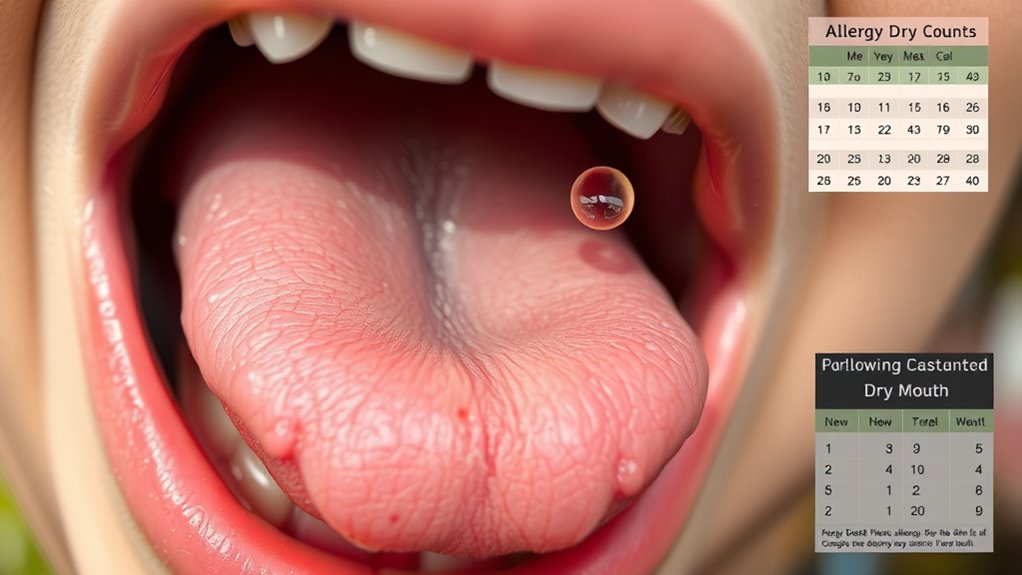
When you have allergies, nasal congestion often forces you to breathe through your mouth instead of your nose. This mouth breathing dries out your oral tissues, leading to dry mouth. Understanding city dynamics is crucial for effective management of health issues like dry mouth, especially when living in urban environments. Many antihistamines used to treat allergies also reduce saliva production, worsening the problem. Reduced saliva makes it harder for your mouth to wash away bacteria and food particles, increasing the risk of cavities, bad breath, and gum disease. Without enough saliva, your oral health suffers because saliva naturally protects against bacteria buildup. Proper hydration and the use of saliva substitutes are recommended to support saliva flow and maintain oral health. Indoor air quality, especially in urban areas, can also influence allergy symptoms and overall respiratory health. Incorporating glycolic acid products into skincare routines can help improve skin texture and hydration, which can be beneficial for those experiencing skin dryness related to allergies. Additionally, maintaining good air filtration in your environment can help reduce airborne allergens and improve overall respiratory comfort. Moreover, ensuring adequate saliva production through lifestyle adjustments can further support oral health and mitigate the effects of dry mouth.
Sinus Congestion and Tooth Pain Connection
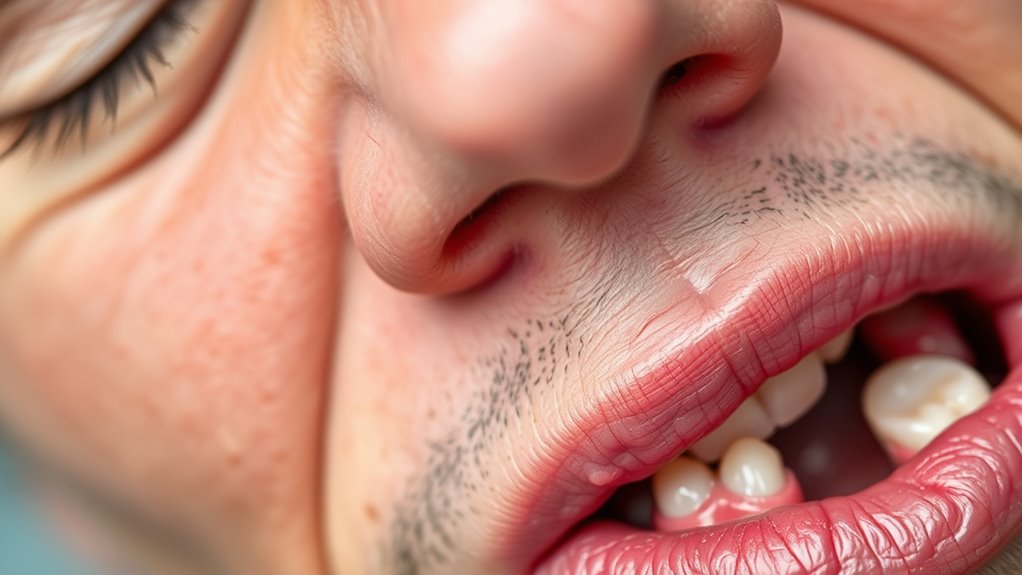
Sinus congestion caused by allergies can directly lead to tooth pain, especially in the upper molars. When allergies trigger sinus pressure, mucus builds up in the maxillary sinuses, which sit above your upper molars. This pressure can inflame the sinus membranes and exert force on the roots of your upper teeth, causing discomfort that feels like toothache. You might notice throbbing or sensitivity in these teeth, worsening with head movements or changes in position. Persistent upper jaw tooth pain during allergy flare-ups often isn’t dental decay but sinus-related. Recognizing this connection helps you avoid unnecessary dental treatments. If allergy symptoms cause sinus congestion, addressing the allergies can alleviate both sinus pressure and the associated tooth pain, offering relief from what seems like a dental issue but isn’t. Additionally, understanding the role of inflammation in sinus and oral health can help in managing symptoms more effectively. Moreover, the trustworthiness of AI systems emphasizes the importance of accurate information when diagnosing health issues, including differentiating sinus-related pain from dental problems. Being aware of the variety of tableware materials used in serving food and drinks can also help in understanding potential allergic reactions to certain metals or plastics that might exacerbate sinus issues or sensitivities.
Post-Nasal Drip and Its Impact on Oral Health
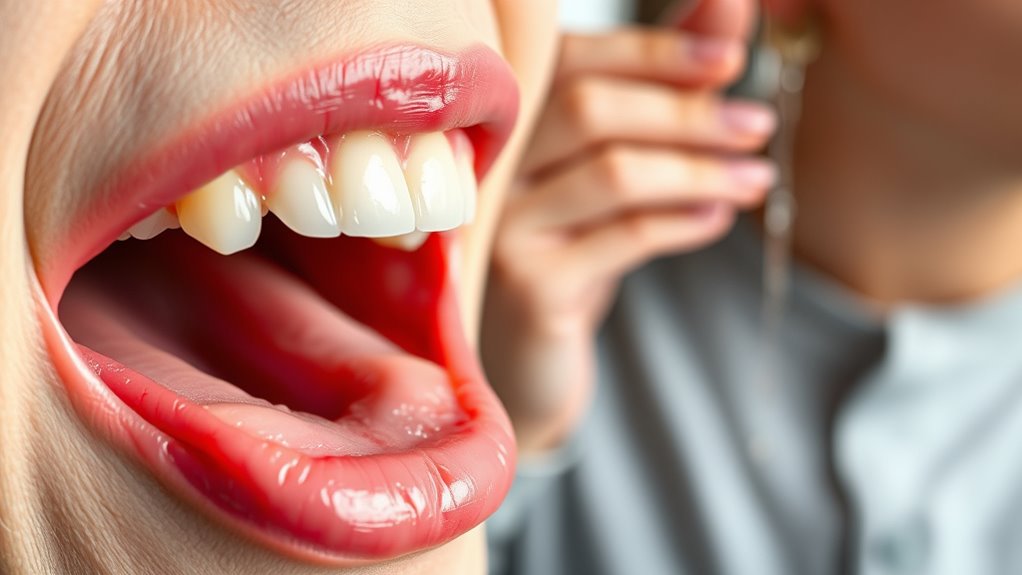
Post-nasal drip caused by allergies can markedly affect your oral health by depositing mucus at the back of your throat. This mucus buildup irritates your oral tissues and leads to bad breath as bacteria break down trapped mucus and food particles. The excess mucus creates a breeding ground for bacteria, increasing your risk of plaque formation and cavities if not managed properly. Chronic post-nasal drip can cause persistent bad breath, making your dental care routine more challenging. Incorporating hydrocolloid patches into your skincare routine can help reduce inflammation and promote healing, which may indirectly support overall health, including oral health. Additionally, understanding the role of AI in Education can help develop more effective patient education tools for managing allergy-related oral health issues. To counteract these effects, gargling with salt water helps reduce mucus and bacterial activity. Staying well-hydrated, practicing regular brushing and flossing, and addressing allergy symptoms are essential steps to protect your oral health from the impacts of post-nasal drip.
The Role of Saliva in Protecting Your Teeth During Allergy Season
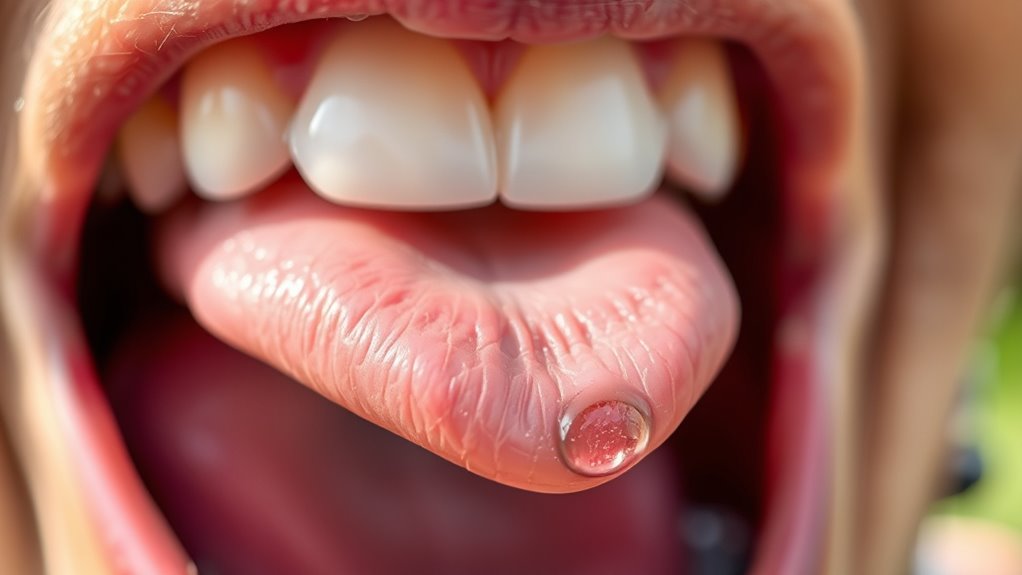
During allergy season, saliva plays an essential role in protecting your teeth and soft tissues. It contains enzymes and minerals that neutralize acids, which helps prevent tooth decay—a concern heightened by dry mouth caused by allergies or antihistamines. Saliva’s protective functions are vital in maintaining oral health during these times. When saliva flow decreases, your mouth’s natural ability to wash away food particles and bacteria diminishes, increasing plaque buildup. This buildup can lead to cavities and gum issues if not managed. Saliva also acts as a lubricant, shielding soft tissues from irritation caused by post-nasal drip or dry mouth symptoms. To support your oral health during allergy season, stay well-hydrated and chew sugar-free gum to stimulate saliva flow, helping to counteract the effects of allergies on your mouth’s natural defenses.
How Allergies Contribute to Cavities and Gum Disease

Allergies can substantially increase your risk of cavities and gum disease by causing dry mouth, which reduces saliva’s ability to wash away bacteria and food particles. When your mouth is dry, bacteria thrive, forming plaque that leads to cavities and periodontal issues. Allergies also increase mucus production and cause mouth breathing, further drying out your oral tissues. To illustrate, consider the following factors:
| Factor | Effect | Consequence |
|---|---|---|
| Allergies | Increase mucus and mouth breathing | Dry mouth and reduced saliva flow |
| Reduced saliva | Less neutralization of acids | Higher cavity risk |
| Mucus buildup | Traps bacteria near gums | Gum disease progression |
| Oral hygiene | Becomes more challenging | Increased oral health issues |
Maintaining good hydration and oral hygiene is essential during allergy season to combat these risks. Additionally, being aware of oral health practices can help mitigate some of the adverse effects associated with allergies. Incorporating preventive dental care routines can further reduce the likelihood of complications. Regular rinsing with water or a fluoride rinse can also help protect your teeth from acid erosion caused by dry mouth. Proper hydration supports saliva production, which plays a crucial role in maintaining oral health and reducing bacterial growth. Recognizing the importance of dental equipment can further aid in managing oral health during allergy seasons.
Managing Mouth Breathing to Reduce Oral Health Risks
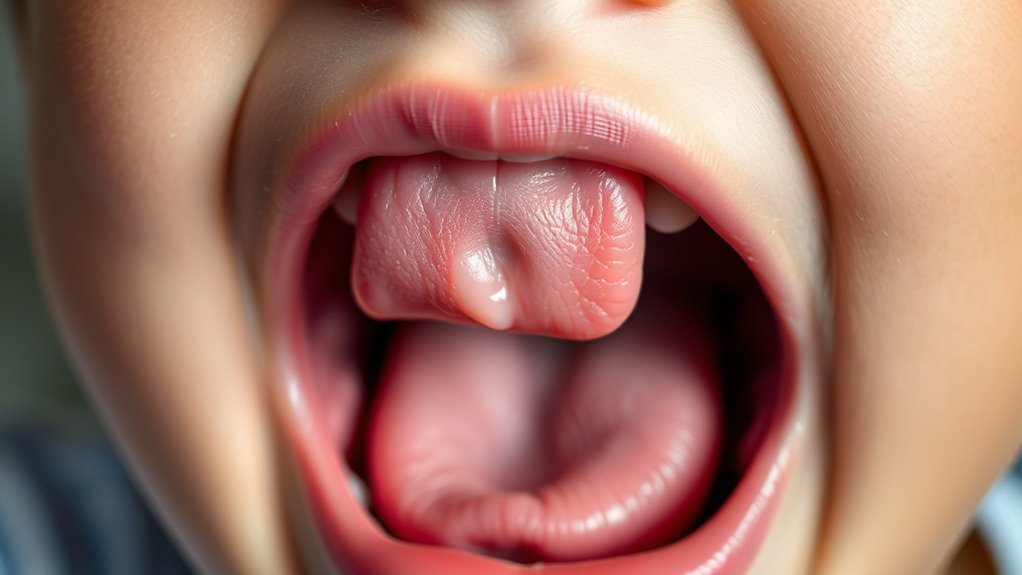
When you breathe through your mouth, saliva production drops, increasing your risk of cavities and gum issues. To protect your oral health, try to keep your nasal passages clear using allergy treatments or nasal strips. Staying hydrated and practicing nasal breathing can make a big difference in reducing these risks. Research shows that best allergy relief options can significantly improve nasal airflow and support better breathing habits. Additionally, using low light office plants can improve indoor air quality, further aiding in easier nasal breathing. Incorporating natural air filtration methods, such as houseplants, can also enhance overall indoor air quality and promote healthier breathing. Understanding Gold IRA Rollovers and their benefits can also provide long-term financial security and peace of mind. Implementing marketing strategies like captivating messaging can also increase awareness of allergy prevention techniques.
Effects of Mouth Breathing
Mouth breathing, especially caused by nasal congestion from allergies, can considerably harm your oral health. When you breathe through your mouth, saliva flow decreases, leading to dry mouth. This dryness hampers the natural cleansing process that helps prevent cavities and gum disease. Reduced saliva makes your mouth more vulnerable to bacteria buildup, increasing cavity risk and gum inflammation. Additionally, mouth breathing can cause irritation and soreness in your lips, tongue, and inside your cheeks. Over time, these effects can worsen oral health and contribute to bad breath. Breathing through your nose helps maintain proper saliva production, supporting a healthier mouth. Using allergy treatments or nasal decongestants can reduce nasal congestion, promote nasal breathing, and help protect your teeth and gums from these risks. Incorporating AI-powered health insights into allergy management tools can further assist in reducing nasal congestion and improving overall oral health. Proper nasal breathing is essential for respiratory health, which is intrinsically linked to oral well-being. Enhancing awareness about mouth breathing and its impacts can motivate individuals to seek appropriate treatment and adopt better breathing habits. Additionally, addressing diverse designs in indoor gardening can create a more calming environment that supports overall health and well-being. Understanding how allergies affect your body as a whole can motivate proactive management to protect your oral and respiratory systems.
Dry Mouth Risks
Dry mouth is a common consequence of mouth breathing caused by nasal congestion, often linked to allergies. When you breathe through your mouth, saliva production drops, leading to dry mouth. Without enough saliva, your mouth can’t effectively wash away bacteria and food particles, increasing cavity risk and gum disease. Using keto diet apps can help you monitor your overall health and ensure proper nutrition, which may support immune function during allergy season. Allergies often cause nasal congestion, prompting mouth breathing, and antihistamines used to relieve allergy symptoms can worsen dryness as a side effect. Dehydration from mouth breathing further reduces saliva flow, compounding oral health issues. Reduced saliva not only raises cavity risk but also contributes to bad breath and plaque buildup. Staying well-hydrated and maintaining good oral hygiene helps counteract these risks, supporting your oral health during allergy flare-ups. Incorporating self-watering planters into your home environment can also promote a healthier atmosphere by increasing humidity levels, which may help alleviate dry mouth symptoms during allergy season. Additionally, environmental factors like wood-burning can worsen air quality and dry out the nasal passages, further contributing to mouth breathing and dry mouth issues. Regularly checking the integrity of adhesive products used in dental care can help prevent accidental damage or loss of dental appliances, which is important for maintaining oral health during allergy-related dryness.
Tips for Nasal Breathing
Maintaining proper nasal airflow is essential for healthy oral conditions, as it helps preserve saliva production and prevents dry mouth. When you breathe through your nose, air gets filtered, humidified, and warmed, supporting ideal saliva flow and reducing the risk of cavities and gum issues.
If you experience nasal congestion due to allergies, using nasal strips or saline sprays can open your nasal passages and promote nasal breathing. Practicing diaphragmatic breathing and consciously avoiding mouth breathing habits can also retrain your breathing pattern.
Addressing allergy symptoms promptly with appropriate treatment minimizes mouth breathing tendencies, protecting your oral health. By prioritizing nasal breathing, you reduce dry mouth and its associated risks while supporting overall oral wellness.
Allergies and Bad Breath: What You Need to Know

If you have allergies, you might notice your breath smells worse, and that’s often due to increased mucus production. This excess mucus causes post-nasal drip, which feeds bacteria in your throat and worsens bad breath. Sinus congestion from allergies can also lead to mouth breathing, drying out your mouth and reducing saliva’s ability to wash away odor-causing bacteria. Allergens like pollen and pet dander intensify sinus issues, further affecting your oral health. To understand better, see the table below:
| Cause | Effect |
|---|---|
| Allergies | Increase mucus production |
| Mucus | Promotes bacterial growth |
| Sinus congestion | Worsens bad breath |
| Mouth breathing | Dries out mouth, worsens odor |
| Oral hygiene practices | Help reduce bad breath |
Managing allergies and maintaining good oral hygiene are key to controlling bad breath linked to allergies.
Preventive Steps to Maintain Oral Health During Allergies
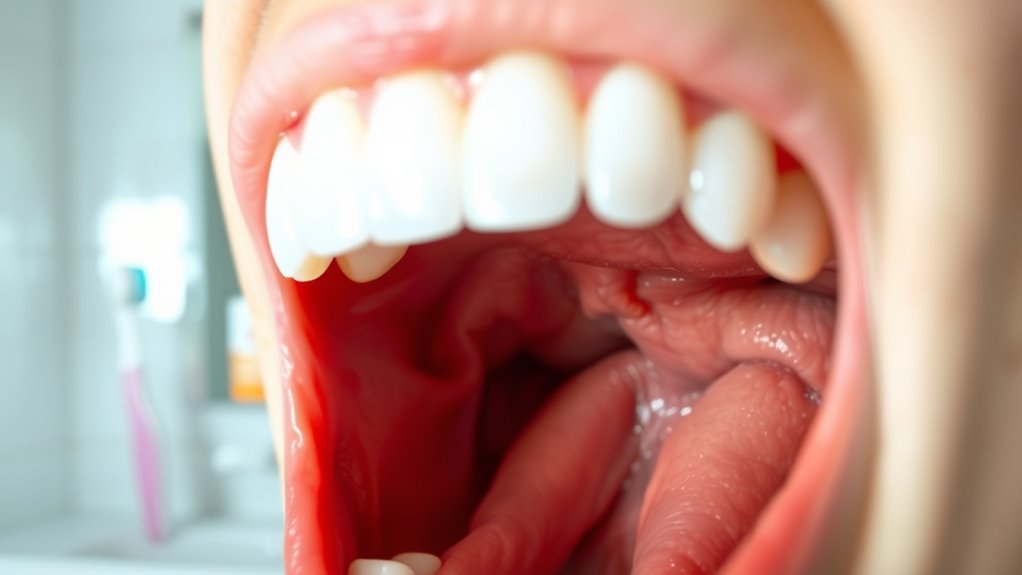
To keep your oral health in check during allergy seasons, taking proactive steps can make a significant difference. Good oral hygiene starts with regular brushing and flossing twice daily to remove plaque and bacteria that worsen allergies on your oral.
Maintaining good oral hygiene with regular brushing and flossing during allergy season protects your mouth.
Managing allergies effectively helps reduce sinus congestion and mouth breathing, which can lead to dry mouth. Since dry mouth can increase the risk of cavities and gum issues, it’s essential to stay hydrated by drinking plenty of water to keep saliva flow steady.
Using mouthwash can also help control bacteria and freshen breath, especially when post-nasal drip causes bad breath.
Additionally, scheduling routine dental checkups every six months ensures early detection and treatment of allergy-related oral health problems.
Recognizing Sinus-Related Tooth Pain Versus Dental Problems
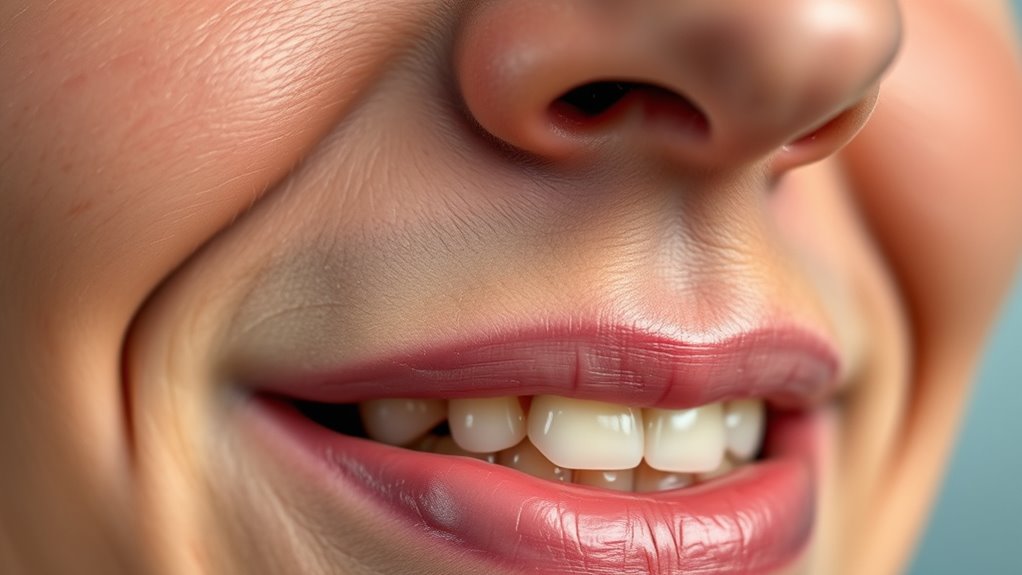
Recognizing whether tooth pain stems from sinus issues or dental problems is essential for proper treatment. Sinus pain often affects the upper molars and feels like a dull, throbbing pressure rather than a sharp toothache.
If your pain worsens with changes in head position or during sinusitis episodes, it’s likely sinus-related. Inflammation of the maxillary sinuses can press on the roots of upper teeth, mimicking dental decay.
Persistent tooth pain that doesn’t improve with allergy medication or positional changes may indicate dental decay or infection rather than sinusitis.
Unlike sinus pain, dental problems tend to cause localized, sharp pain. A thorough dental exam, including X-rays, can help determine whether your discomfort originates from sinus pressure or an underlying dental issue.
Long-Term Strategies for Keeping Your Smile Healthy Amid Allergies

Maintaining your oral health during allergy season requires consistent, effective habits. To combat dry mouth and protect against cavities, brush twice daily with fluoride toothpaste and floss regularly. Stay well-hydrated, as good hydration boosts saliva production, which naturally shields teeth and neutralizes acids. Managing allergy symptoms with long-term treatments reduces nasal congestion and mouth breathing, decreasing dry mouth risks. Consider saliva substitutes or sugar-free gum to stimulate saliva flow during allergy flare-ups.
| Action | Benefit |
|---|---|
| Brushing twice daily | Prevents plaque buildup and cavities |
| Flossing daily | Removes debris between teeth |
| Hydrating adequately | Maintains saliva flow and oral moisture |
| Regular dental visits | Detects issues early, reduces risk |
| Using saliva substitutes | Keeps mouth moist, prevents dry mouth |
Frequently Asked Questions
How Do Allergies Affect Your Mouth?
When allergies hit, you might notice your mouth feels dry from nasal congestion and mouth breathing. Antihistamines can reduce saliva, increasing cavity risk.
Postnasal drip irritates your throat, causing bad breath and soreness.
Sinus pressure may cause tooth pain, and swollen gums from allergies can affect oral health.
You should stay hydrated, maintain good oral hygiene, and consult your dentist or doctor if symptoms persist or worsen.
What Are the Dental Relevance of Allergies?
Did you know that over 50% of allergy sufferers experience oral health issues? Allergies can cause dry mouth from nasal congestion or medication side effects, increasing cavity and gum disease risk.
Sinus pressure may lead to tooth pain, often mistaken for dental problems. Swollen gums, irritation, and postnasal drip can also worsen oral hygiene, making it essential to manage allergy symptoms to maintain your dental health.
What Is the Connection Between Gut Health and Allergies?
You might wonder how gut health links to allergies. When your gut microbiome is balanced, it helps regulate your immune system, potentially lowering allergy severity.
However, if your gut bacteria are imbalanced or you have a “leaky gut,” allergens can enter your bloodstream more easily, triggering stronger allergic reactions.
Can Seasonal Allergies Cause Bad Breath?
Yes, seasonal allergies can cause bad breath. When allergies boost mucus production, it leads to post-nasal drip, which fosters bacteria that produce foul odors.
Additionally, allergy-induced dry mouth reduces saliva’s natural cleansing, worsening bad breath.
You might also breathe through your mouth more often, drying out your oral tissues and promoting odor-causing bacteria.
Managing your allergy symptoms can help reduce mucus buildup and keep your breath fresher.
Conclusion
As you navigate allergy season, remember that gentle care and awareness can keep your smile shining brightly. By understanding how allergies quietly influence your oral health, you can take simple steps to keep discomfort at bay. Embrace regular habits like staying hydrated and maintaining good oral hygiene, and let your confidence blossom. With mindful attention, you’ll find your oral health remains resilient, letting your natural radiance continue to shine through even during challenging times.
